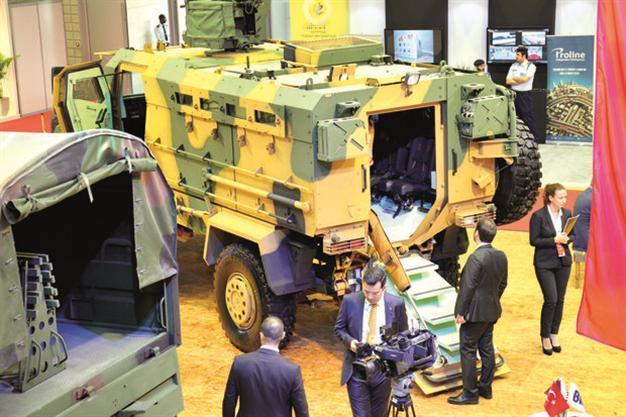Another Koç business casualty in silent war with government?
Burak Bekdil

An Aug. 5, 2014, analysis in this column said Koç Holding’s armored vehicle manufacturer Otokar could face a challenge from BMC in a contract to build 1,000 indigenous main battle tanks, despite being the creator of a prototype of the armored carrier, the Altay. Fourteen months later, BMC’s boss Ethem Sancak whose personal friendship with President Recep Tayyip Erdoğan is well-known, said his company would bid for the multibillion-dollar tank contract. Sancak said BMC would join the bidding with foreign partners he declined to name.
Otokar designed, developed and is producing four prototypes, under a $500 million contract, of the Altay, the new-generation Turkish tank, but a much bigger contract for its serial production is in the offing.
Defense procurement authorities will officially launch the contract for the serial production of the Altay after the prototype program has been completed.
Only a few months after a June 2013 political row between Koç and the government, the group’s shipyards lost a nearly $2 billion deal which it had won on an interim basis. That row has already subsided, but Sancak is a challenging newcomer in the armor market.
The first major public tension between Koç and Erdoğan’s government emerged in 2013 during the Gezi Park protests. In one incident during the month-long anti-government demonstrations, protesters attempted to escape police tear gas and pepper spray by taking refuge in an Istanbul hotel, the Divan, owned by Koç. Hotel management admitted the protesters into its lobby, which quickly turned into a makeshift first aid room.
The police fired more tear gas and pepper spray into the hotel lobby although it is illegal to fire these chemicals into indoor spaces. It was reported that Ali Koç, a board member and third-generation family member, had ordered the hotel to help the protesters.
A few days later, an angry Erdoğan said in a public rally: “We know which hotel owners helped terrorists [protesters]. It is a crime to abet terrorists. And those crimes will not remain unpunished.”
Shortly after that brawl, tax police raided Koç’s refinery subsidiary, Tüpraş. Officials said it was a regular inspection. But in September 2013 the government’s executive committee that oversees defense procurement scrapped a $2 billion deal with Koç’s shipyards, RMK Marine, pledging a new competition.
Back in January 2013, RMK had signed the contract to build six vessels under the program dubbed MİLGEM.
Defense officials did not comment on any future competition between Otokar and BMC to win the tank contract. “You know very well which [government] body makes the final decisions on procurement,” said one official, without elaborating.
Top defense procurement decisions are made at the Defense Industry Executive Committee chaired by Prime Minister Ahmet Davutoğlu. Its other members are Defense Minister Vecdi Gönül, chief of the military General Staff, Gen. Hulusi Akar, and chief procurement official, İsmail Demir.
Defense industry insiders say the future of the tank deal may depend heavily on the election results on Nov. 1. “Whether there will be a single party [Justice and Development – AKP] government or a coalition is more relevant to the tank program than which solutions the contenders will propose,” said one source.
Some view Otokar as the “natural” winner of the program as it designed, developed and is producing the Altay prototypes. But others say they suspect a lot of political meddling in the tender process.
“Sancak is not just a rival businessman,” said one defense source. “Everyone knows who he is and what strong bonds he has with the political establishment.”
The race for the serial production will involve an initial batch of 250 tanks to be followed by three follow-on orders each comprising 250 more tanks.
In 2014, BMC, a previously failed company, emerged as a serious rival in Turkey’s armored vehicles market after Sancak’s investment fund ES Mali Yatırım ve Danışmanlık A.Ş. in May bid 751 million Turkish Liras ($359 million) for BMC.
Sancak used to mostly operate in the pharmaceutical and health sectors, but he has switched the focus of his business toward “building up a strong presence in the media and defense sectors.” His media outlets are widely known to be pro-Erdoğan publications.
BMC manufactures the Kirpi, a mine-resistant, ambush-protected (MRAP) vehicle. The Kirpi is the country’s first locally designed and developed MRAP. Sancak says he will sell scores of the Kirpi not only to the Turkish military but also to Gulf countries, most notably to Qatar, also Erdoğan’s staunchest regional ally.
 An Aug. 5, 2014, analysis in this column said Koç Holding’s armored vehicle manufacturer Otokar could face a challenge from BMC in a contract to build 1,000 indigenous main battle tanks, despite being the creator of a prototype of the armored carrier, the Altay. Fourteen months later, BMC’s boss Ethem Sancak whose personal friendship with President Recep Tayyip Erdoğan is well-known, said his company would bid for the multibillion-dollar tank contract. Sancak said BMC would join the bidding with foreign partners he declined to name.
An Aug. 5, 2014, analysis in this column said Koç Holding’s armored vehicle manufacturer Otokar could face a challenge from BMC in a contract to build 1,000 indigenous main battle tanks, despite being the creator of a prototype of the armored carrier, the Altay. Fourteen months later, BMC’s boss Ethem Sancak whose personal friendship with President Recep Tayyip Erdoğan is well-known, said his company would bid for the multibillion-dollar tank contract. Sancak said BMC would join the bidding with foreign partners he declined to name.